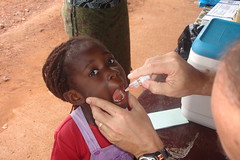
I came to India to see how Rotary fits in with the incredibly massive undertaking of immunizing 172 million children under the age of 5 for the second time this year. Last year they had to immunize on 8 different occasions because the children have many other systemic problems going on and the live polio vaccine can’t stay in their little stomachs long enough to work.
On the NID day I observed Indian health workers from local neighborhoods who knew, identified and found all of the children that fit the target age category. When we talk of ‘neighborhoods’ they are not anything like what we associate with at home. A neighborhood in India could range from a series of one room ‘apartments’, with or without electricity or running water to plastic bag or tar paper shacks in the mud with open sewers. The issues in India are massive.
Where my team was located the local Rotarians found being active on this endeavor difficult due to their business responsibilities. During the initial push years ago, local Rotarians assisted more. Our fellow Rotarians are tired, but by having visitors from the U.S. come over to help, not monitor, I think I have helped, perhaps in a little way, to encourage the local Rotarians to get back involved and be a part of history by assisting the workers on the ground again in these last efforts to eradicate polio.
I am proud to be a Rotarian and witness to the ongoing efforts of Polio eradication.





